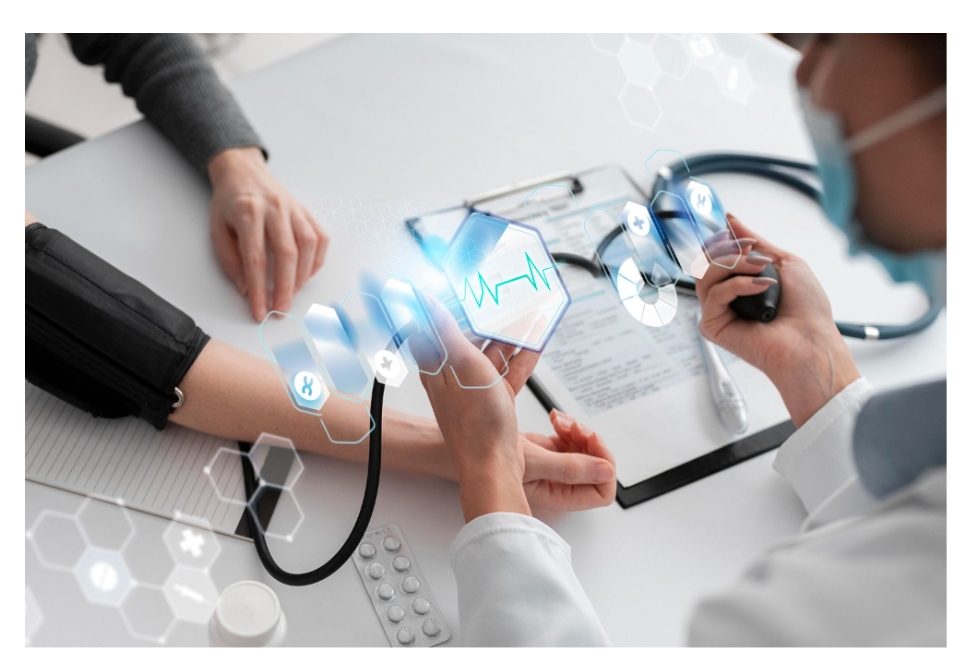In the current society where information is becoming a crucial factor, the healthcare sector is experiencing a radical change through big data analysis. Healthcare big data is enhancing the management of patients, diagnosis, and other medical results. This article explores the significance, advantages, limitations, and potential of this disruptive innovation in the healthcare industry.
What is Big Data in Healthcare
Big data analytics entails the analysis of voluminous data characterized by velocity, complexity, and variability. Such datasets need high-end technologies and methods for data capture, storage, sharing, administration, and analysis. In the healthcare industry, big data can be categorized into several types:
- Web and Social Media Data: Data gathered from the user’s activities on the websites and in the mobile applications.
- Machine Data: Data generated by sensors, meters, and other devices.
- Transactional Data: Includes healthcare claims, billing records, and other financial transactions.
- Biometric Data: It includes fingerprints, DNA samples, and writing samples.
- Human-Generated Data: It includes structured data which can be arranged in the form of rows and columns, unstructured data which does not have any pre-defined structure and semi-structured data which has some structure but not completely.
Big data in healthcare is defined as the use of these big data analytics techniques in the healthcare sector. This sector is also growing very fast, the market size of this sector is expected to increase from $33 billion in 2021 to $106 billion in 2030, at a compound annual growth rate of 14% as estimated by Straits Research. This growth underlines the growing focus on data to enhance patients’ experiences, refine diagnosis, and increase the effectiveness of medical treatments.
Benefits of Big Data in Healthcare
The application of big data in healthcare is quite valuable for several organizations ranging from small clinics to large pharma companies. Here are five significant advantages of big data healthcare analytics:

- Cost Reduction Utilizing big data in healthcare, the application of this method can also result in significant cost reduction. For instance, Datavant CEO Pete McCabe said that optimized use of big data could reduce 50%–75% of ineffective healthcare expenditures, which is equal to $500 billion to $750 billion of the US healthcare industry. In the healthcare system, big data analysis for identifying patterns and trends affects the systems positively enabling organizations to operate efficiently and at a lesser cost. For example, with the help of predictive analytics, the number of consumables required in the various departments of a hospital can be predicted and orders placed when the prices are low.
- Minimizing Medical Errors The application of big data analytics in the health sector can greatly minimize the occurrence of medical mistakes. In using EHRs for data analytics, the suspected entries can be highlighted for review by medical experts due to possible irregularities. Scholars at Johns Hopkins have come up with ways of applying big data to address diagnostic mistakes through the analysis of patient’s signs and symptoms against commonly missed diseases.
- Improving Diagnostics and Predictions Computers cannot substitute human physicians, but they can increase the quality of care by assisting in diagnostic activities. Big data and machine learning can be used to analyze a patient’s symptoms and determine which diseases are most likely to be causing the patient’s condition and what tests are likely to be needed to confirm a diagnosis. Further, big data analytics can also help in finding out the patient population that is at a greater risk of developing complications and hence can be managed better.
- Increasing Health Indicators Big data analytics has been used to enhance public health factors in different fields including diabetes and mental health. A paper in the Journal of Medical Internet Research has revealed that big data analytics has helped in diagnosing diseases and managing chronic diseases hence a positive impact on health.
- Enhancing Patient Experiences Big data analytics in the healthcare industry is useful in coming up with the right decisions that will enhance the quality of healthcare being offered to patients and their satisfaction. Knowing the patient data, doctors and other health care providers can provide treatment that would improve the results and patient satisfaction. Healthcare consumers will receive accurate diagnoses, proper treatment, and a more efficient experience in the healthcare systems.
In conclusion, big data in healthcare is transforming the industry by reducing costs, reducing errors, improving diagnostics, improving public health indicators, and improving patient experiences. As technology advances, the potential benefits of big data analytics in healthcare will continue to grow, driving better outcomes for patients and healthcare providers alike.
Examples of Big Data in Healthcare
Big data in healthcare encompasses a wide range of applications, from managing population health to advancing drug discovery and clinical trials. Here are several key use cases illustrating how big data is transforming the healthcare sector:
- Patient Segmentation: By analyzing healthcare data, providers can categorize patients into different groups based on various criteria. For instance, pharmaceutical companies can use patient segmentation to identify suitable candidates for clinical trials of new treatments.
- Health Plan Analytics: Health plans leverage big data to enhance customer experiences, reduce medical costs, minimize inefficiencies, and foster innovation. This analytical approach helps in developing more efficient health plan strategies.
- Treatment Outcome Analysis: Utilizing inputs such as Diagnosis-Related Group (DRG) codes, big data analytics can predict patient outcomes and estimate treatment costs, aiding in more accurate and cost-effective healthcare planning.
- Evidence-Based Medicine: Big data analytics supports evidence-based medicine by analyzing scientific data to assist in clinical decision-making, ensuring that treatments are based on the best available evidence.
- Real-Time Patient Monitoring: Hospital sensors and monitors use streaming data to track patients in real-time, allowing for immediate interventions by healthcare staff when necessary, thus improving patient safety and care quality.
- Clinical Decision Support: Data analytics provides healthcare professionals with patient-specific assessments and recommendations, enhancing clinical decision-making processes and outcomes.
- Predictive patient risk assessment: A predictive model identifies patients at risk for a particular condition or complication, such as patients who are likely to be readmitted to the hospital.
- Telehealth Analytics: Analyzing data from remote monitoring devices helps ensure patient care in treatment plans and predicts potential health problems, making telehealth a flying option effectiveness of care delivery.
- Patient Satisfaction and Experience: Big data analysis of patient data, surveys, and other qualitative data helps improve hospital facilities, patient care practices, and the overall patient experience.
- Wearable Device Analytics: Data from wearable health devices, such as fitness trackers and smartwatches, are analyzed to monitor patient health metrics in real-time, providing valuable insights for ongoing health care
Big Data in Healthcare improves patient care and outcomes, it provides cross-cutting efficiency and innovation. By using comprehensive assessments, healthcare providers can deliver more personalized and effective treatments, ultimately transforming the healthcare landscape.
Big Data Applications in Healthcare
The applications of big data in healthcare are vast and varied, providing the works are great. Some of the main applications are:
- Population Health Management: Use of big data to monitor and monitor population health, identify risks, and implement preventive measures.
- Precision Medicine: Personalizing medicine by examining genetic, environmental, and lifestyle factors.
- Health care fraud detection: Analysis of patterns and anomalies in health care information and services to detect fraudulent activity.
- Resource Utilization: To increase resources such as personnel, equipment, and materials by analyzing their usage and predicting future needs.
- Patient Participation: Empowering patients through access to health information and personal opinions, to actively participate in health care.
- Regulatory Compliance: Ensure compliance with healthcare regulations by maintaining accurate and complete data records.
Get Your Big Data Solutions with KMS Healthcare
Big Data in Healthcare is a dynamic and rapidly growing field. With this potential, it can change with healthcare delivery and research. By harnessing the vast amounts of available data, healthcare organizations can uncover valuable insights, improve patient care, advance medical research, and better manage public health.
To get the most out of big data analytics, it’s important to work with a technical professional. KMS Healthcare stands out in healthcare technology, providing high-quality healthcare software technology solutions. Our team of experienced professionals has extensive experience in developing healthcare mobile apps, ensuring system interoperability, and automating analytics methods. If you use the KMS Healthcare role, you can Big Data in Healthcare to stimulate innovation and fully implement; hence improving the results throughout the organization.







